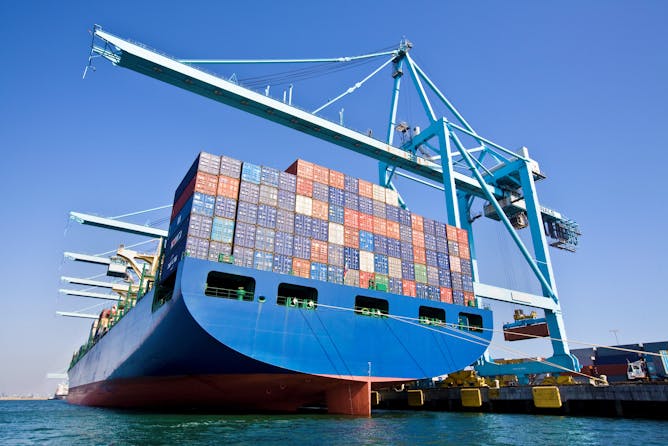|
International shipping is one of the biggest climate-polluting industries in the world – and one of the toughest to clean up. But some of its leading companies, including Maersk and Evergreen, now appear to be trying.
Don Maier, a shipping researcher at the University of Tennessee, spent decades working in the industry. He describes several factors giving companies the confidence they need to make high-stakes investments in cleaner power, including new climate policies in Europe and a new global strategy to reach net-zero emissions by the middle of the century.
“The strategy’s language is vague, obscure and almost noncommittal,” Maier writes. “But it points the industry toward a cleaner future.”
|

|
Stacy Morford
Environment + Climate Editor, The Conversation U.S.
|
|

Don Maier, University of Tennessee
International shipping is a big contributor to climate change, and it doesn’t change quickly, but it’s companies are starting to invest in cleaner fuels.
|
|
|
Quote of the week 💬
|
-
“Patients and their providers increasingly face limited or nonexistent supplies of drugs, many of which treat essential conditions such as cancer, heart disease and bacterial infections. The American Society of Health System Pharmacists now lists over 300 active shortages, primarily of decades-old generic drugs no longer protected by patents."
– Geoffrey Joyce, director of health policy at the University of Southern California's Schaeffer Center, from his story Blame capitalism? Why hundreds of decades-old yet vital drugs are nearly impossible to find
|
|
Economy
|
-
Bashar Malkawi, University of Arizona
China has responded to US sanctions with its own set of punitive measures. An expert on international trade explains the standoff and what it means for countries and companies caught in the middle.
|
|
Labor
|
-
Jason Miller, Michigan State University
The strike would have been the first for the parcel delivery giant since 1997.
|
|
Work
|
-
Luke Fletcher, University of Bath; Nishat Babu, Loughborough University
From the cost of living crisis to climate change, research shows how companies can better support employee wellbeing during difficult times.
|
|
Commodities
|
-
Anna Nagurney, UMass Amherst
Russia’s move, which it followed by bombing the key port city of Odesa and threatening to attack any ship sailing for Ukraine, sent global food prices skyrocketing.
|
|
Companies
|
-
Nicoletta Corrocher, Bocconi University
Netflix’s different subscription packages are designed to increase profits, while it keeps users engaged with a steady flow of new content devised via its algorithm.
|
|
Currencies
|
-
Abhishek Mukherjee, University of Waikato; Paresha Sinha, University of Waikato; Paul David Richard Griffiths, EM Normandie
New Zealand’s central bank is taking a long, hard look at cryptocurrencies and the role they will play in future business. Here’s what businesses had to say about our digital future.
|
|
More from The Conversation |
|---|
| |
|
| |
| |
| |
| |
|
|